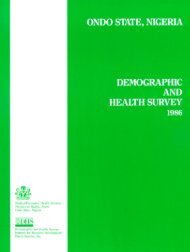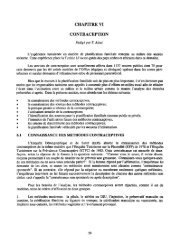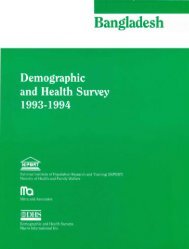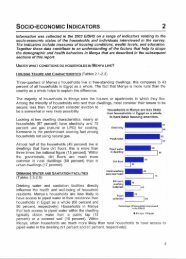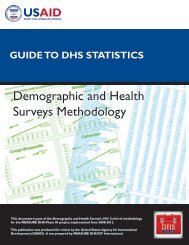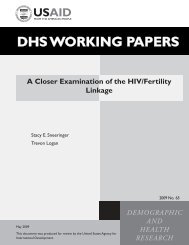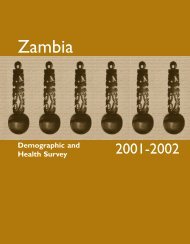Tanzania HIV/AIDS and Malaria Indicator Survey ... - Measure DHS
Tanzania HIV/AIDS and Malaria Indicator Survey ... - Measure DHS
Tanzania HIV/AIDS and Malaria Indicator Survey ... - Measure DHS
- No tags were found...
Create successful ePaper yourself
Turn your PDF publications into a flip-book with our unique Google optimized e-Paper software.
1.2 NATIONAL POLICY ON <strong>HIV</strong>/<strong>AIDS</strong>In response to the <strong>HIV</strong>/<strong>AIDS</strong> p<strong>and</strong>emic, the Government of <strong>Tanzania</strong> has made substantialvaluable progress in nearly all areas of <strong>HIV</strong>/<strong>AIDS</strong> prevention, care, <strong>and</strong> treatment. Progress has alsobeen made in impact mitigation through communication <strong>and</strong> advocacy, <strong>and</strong> community participationthrough multisectoral response, as a basis for the consolidation <strong>and</strong> expansion of the nationalresponse.The <strong>Tanzania</strong>n Government recognizes the social development challenges of the epidemic<strong>and</strong> has taken concrete measures to address these challenges. The challenges of <strong>HIV</strong>/<strong>AIDS</strong> needconcerted <strong>and</strong> multidisciplinary efforts from all sectors, government <strong>and</strong> non-government, includingcivil society organizations <strong>and</strong> the community at large. In line with this, the <strong>Tanzania</strong> Commission for<strong>AIDS</strong> (TAC<strong>AIDS</strong>) was created by a statute of the Parliament in 2001. TAC<strong>AIDS</strong> is m<strong>and</strong>ated toprovide strategic leadership <strong>and</strong> coordination of multisectoral response as well as monitoring <strong>and</strong>evaluation, including research, resource mobilization, <strong>and</strong> advocacy. The National Policy on<strong>HIV</strong>/<strong>AIDS</strong> <strong>and</strong> the National Multisectoral Strategic Framework (NMSF) are the guiding tools for theimplementation of <strong>HIV</strong>/<strong>AIDS</strong> activities. The NMSF 2003-2007 has been completed <strong>and</strong> the secondNMSF, which covers the period 2008 to 2012, is in place. The new NMSF builds on the achievements<strong>and</strong> strengths of the national response to the <strong>HIV</strong> epidemic in 2003-2007. Through coordination, theNMSF guides the approaches, interventions, <strong>and</strong> activities that are undertaken by stakeholders in thecountry.<strong>HIV</strong>/<strong>AIDS</strong> is among the development agenda in the National Strategy for Poverty Eradication(MKUKUTA), <strong>and</strong> the National Development Vision of 2025. The policy emphasizes themainstreaming of <strong>HIV</strong>/<strong>AIDS</strong> in all sectors. The development of the National Guideline on Prevention<strong>and</strong> Control of <strong>HIV</strong>/<strong>AIDS</strong> in the public sector is an achievement of the Government that shows itscommitment to fight the epidemic <strong>and</strong> to improve the well-being of the people. The 2007-08 THMISis a potential source of information for monitoring <strong>and</strong> evaluation of <strong>HIV</strong>/<strong>AIDS</strong> programmes in thecountry.1.3 NATIONAL POLICY ON MALARIA<strong>Malaria</strong> has been <strong>and</strong> continues to be a major cause of illness <strong>and</strong> death in both Mainl<strong>and</strong><strong>Tanzania</strong> <strong>and</strong> Zanzibar. The disease remains a major impediment to socio-economic growth <strong>and</strong>welfare. To reduce the burden of malaria, the Government of <strong>Tanzania</strong> through the <strong>Malaria</strong> ControlProgrammes, the National <strong>Malaria</strong> Control Programme (NMCP), <strong>and</strong> the Zanzibar <strong>Malaria</strong> ControlProgramme (ZMCP), have undertaken various actions supported by development partners such as theGlobal Fund to fight against <strong>HIV</strong>/<strong>AIDS</strong>, Tuberculosis <strong>and</strong> <strong>Malaria</strong> (GFATM), the US President’s<strong>Malaria</strong> Initiative (PMI), The World Bank, <strong>and</strong> UNICEF.The long-term goal of malaria control is to significantly reduce morbidity <strong>and</strong> mortality due tomalaria, with special attention to the most vulnerable groups—children under five, pregnant women,<strong>and</strong> the poor—<strong>and</strong> in so doing, to promote economic development.The goal of the National <strong>Malaria</strong> Medium Term Strategic Plan 2008–2013 is to reduce theburden of malaria by 80 percent. This goal is in line with the Global initiative, that advocates a rapidscaling of interventions to achieve the Roll Back <strong>Malaria</strong> target of universal coverage of 80 percent by2010 <strong>and</strong> the Millennium Development Goals by 2015.The main objective of the Zanzibar <strong>Malaria</strong> Medium Term Strategic Plan 2008-2012 is tofurther reduce the burden of malaria by 70 percent from the 2006 level of 35 percent to 11 percent by2012. This goal will be achieved by maintaining high coverage of effective interventions <strong>and</strong>establishing epidemic detection <strong>and</strong> response mechanisms.2 | Introduction



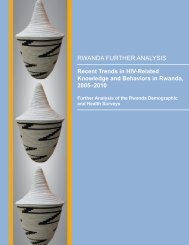
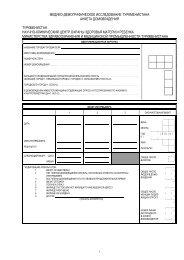
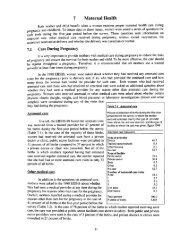


![Obtaining Informed Consent for HIV Testing [QRS4] - Measure DHS](https://img.yumpu.com/49850117/1/190x245/obtaining-informed-consent-for-hiv-testing-qrs4-measure-dhs.jpg?quality=85)
